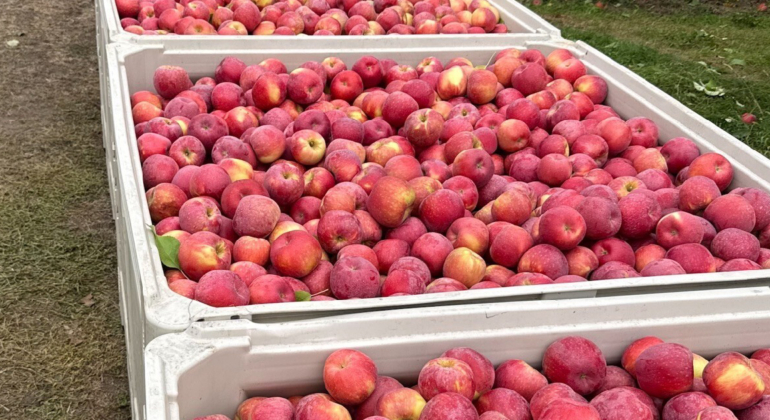What Makes a Brand “Sustainable Food”?
With hundreds of food brands touting their sustainability, how do we determine which ones are truly making an impact? For conscious shoppers, sustainability is no longer simply a designation that is nice to have – it’s a benchmark requirement. Feeding our planet is a massive environmental and resource burden, and securing a sustainable food future requires addressing the environmental, social, economic, cultural, and health aspects of our food. Although brands alone cannot solve this, they can have a huge impact by setting an example across the supply chain. To get a deeper understanding, let’s dive into some key factors that contribute to a brand’s sustainability.
Regenerative Farming Practices
Regenerative farming focuses on restoring and enhancing the health of the land, rather than depleting it. This innovative system encompasses practices such as crop rotation, cover cropping, organic fertilizing, and topsoil regeneration to increase biodiversity and lessen climate-change impacts. Food brands can play a pivotal role in promoting regenerative farming by sourcing ingredients from regenerative farms, supporting local farmers who adopt these practices, and communicating the positive
Low Emissions
According to a recent study in the journal Nature Food, the food system accounts for more than 30% of global greenhouse gas (GHG) emissions. Existing mass production, transportation, and agriculture methods are extremely unsustainable, and brands have a responsibility to take steps toward decarbonization. Regenerative farming, combined with localized production and farming, can lower emissions. Companies can also utilize clean energy sources like solar, wind, and hydro and shift to fuel-efficient transportation of goods.
Fair Trade
Fair trade-certified brands take an active role in improving the living and working standards of farmers, investing in their communities and businesses, and protecting the environment. Fair trade is a highly trusted sustainability label that recognizes the relationship between environmental and human rights practices and a brand’s dedication to both.
Reducing Waste
Food brands inherently create waste, so any opportunity to reduce packaging and mitigate waste is essential for sustainability. This can be done by making packaging more compact, recyclable, or compostable and choosing high-quality materials. When recycling, composting, and reusing are enforced company-wide and across the supply chain, brands can set a standard and significantly minimize material waste.
Now, let’s dive into four brands that are actively working to change sustainability standards by excelling in one or more of these areas.
- Nature’s Path: Founded in 1985, Nature’s Path Foods, often referred to as Nature’s Path, is a family-owned company and one of the first-ever organic brands. It specializes in crafting certified-organic food items and is especially renowned for its breakfast cereals. Despite its availability in grocery stores across the nation, Nature’s Path is loyal to sustainable practices and invested in regenerative organic farming. The brand only uses organically farmed ingredients, which sequester 40% more carbon than conventional farming. In addition, the company’s three manufacturing facilities have achieved Zero Waste certification, and it plans to become climate-neutral and have 100% reusable, recyclable, or compostable packaging by 2025. It is also invested in its employees living sustainably, as team members are given sustainability training and incentivized with credits for each trip taken on mass transit or by walking, cycling, or carpooling.
- Lundberg Family Farms: Lundberg Family Farms’ commitment to agricultural conservation has existed for four generations, beginning in 1937. The Lundberg family’s restorative-farming efforts, which include promoting water conservation, using crop rotation, cultivating cover crops, and employing natural pest-control methods, have positioned them as pioneers in the field of organic rice cultivation. As part of the brand’s promise to “leave the land better than we found it,” the company has achieved a Platinum TRUE Zero Waste certification, collecting, diverting, and recycling 99.7% of materials used on-site and utilizing post-consumer content in 30% of its packaging. Another impressive feat is that Lundberg’s manufacturing facility is fueled by 100% renewable solar and wind energy. Also, Lundberg’s products are Regenerative Organic Certified®, USDA Organic and Non-GMO Project Verified, and it partners with the Sustainable Food Trade Association (SFTA), One Step Closer to an Organic and Sustainable Community (OSC2), and the Climate Collaborative (CC).
- Vital Farms: Founded in 2007, Vital Farms consists of a network of more than 300 family-run farms dedicated to producing high-quality, pasture-raised eggs and ethically produced butter and ghee. The company is committed to animal welfare, and all hens enjoy certified organic supplemental feed and at least 108 square feet of pasture. Every 21 days, the hens are rotated to a new section of pasture to help the land recover. The brand also does a great job of showcasing its local, small-farm ethos, as each egg carton names the specific farm it came from, which can be searched to get a 360-degree look at the actual pasture. Vital Farms also has five farms actively practicing regenerative principles, and the brand is pioneering “restorative eggs,” which are pasture-raised, USDA Certified Organic, and produced using regenerative farming practices like utilizing cover crops and perennial rotations.
- Barnana: Barnana is the no. 1 organic plantain chip in the United States, and the brand helped pioneer the practice of upcycling to reduce food wastage. Nearly 60% of banana biomass is wasted after harvest, about 114.08 million metric tons. To help combat this, Barnana upcycles fresh bananas and plantains that otherwise would have been wasted and turns them into usable products. The brand also follows fair trade and restorative farming practices, working with a network of 1,400 smallholder and Indigenous farmers to purchase crops at 30% above market prices to ensure fair wages. This innovative brand is showcasing how upcycling can support the environment, farmers, and a company’s profitability.
After taking a look at these example brands, why should consumers and marketing agencies support sustainable food brands?
Studies indicate that by the year 2100, the global food system alone could contribute to almost 1 degree Celsius of warming, and we can avoid half of this warming by improving our food system and diets. Conventional agriculture practices pollute the air and water and endanger wildlife, and the UN estimates that approximately half of all fruits and veggies produced globally are wasted. Brands engaging in sustainable farming and production can make incremental change that sets an example for the world to follow and takes the burden away from individual consumers.
Sustainability efforts should be shared proudly, and marketing and PR agencies have a unique role to play in uplifting the brands that are making the right environmental choices and helping them report sustainability progress accurately.
Are you a sustainable food brand looking to get exposure? We’re here to help! Contact Rebecca Holmes at rebecca@kiterocket.com to learn more.


